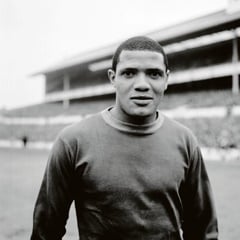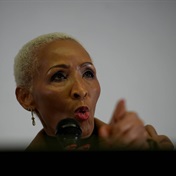
When Arsenal and Aston Villa players tread on the hallowed ground of Wembley Stadium for Saturday’s FA Cup final, one of the invited guests will be Yvonne Johanneson.
Fifty years ago, Yvonne’s father, Albert “Hurry Hurry” Johanneson, became the first black player in the history of the Beautiful Game to feature in the final of the world’s oldest domestic competition. He was part of the Leeds United team that went down 2-1 against Liverpool.
On Saturday, black players should feature prominently in both sides, with Christian Benteke, Fabian Delph, Charles N’Zogbia and Carlos Sánchez likely to be in the Aston Villa line-up, while Francis Coquelin, Danny Welbeck and Alex Oxlade-Chamberlain could be among the Gunners’ starters.
But while Johanneson is widely recognised in England as a trailblazer, who paved the way for the many black players that have since become a regular feature in every major league in the world, the Germiston-born player remains much of an unknown entity in his home country, South Africa.
One of the few who remember him is Godfrey Gxowa, who has been described as a walking encyclopaedia of South African football. But even the long-time football official, who joined Moroka Swallows a year after the World Cup in Brazil in 1950, can’t recall which local club the gifted Johanneson played for.
“He did not play for any of the big clubs involved in the fledgling professional league. We had heard that there was a damn good player on the East Rand but, because he didn’t play for the likes of Pirates or the Birds, not that much was known about him.”
Leeds United invited the winger for a three-month trial at the end of 1960, after being made aware of his ability by a South African teacher, who scouted for Leeds and felt the club was the best option for the 20-year-old Johanneson – because they already had a black South African called Gerry Francis on their books.
“Hurry Hurry”, as he was fondly called, so impressed the Leeds coaching staff that he was offered a professional contract and played his first match in April 1961. He immediately created an impression by setting up one of Jack Charlton’s goals in a 2-2 draw against Swansea Town.
Downward spiral
He went on to play close to 200 matches for Leeds, highlighted by the FA Cup final appearance, before seeing out his career at York City. There he scored three goals in 26 matches before he retired in 1972.
Sadly, his life took a downward spiral from there. He succumbed to alcoholism and died – poor and alone – in a Leeds flat in 1995, aged just 55.
Irish international Johnny Giles, who played for Manchester United before becoming one of Johanneson’s team-mates at Leeds and playing in the FA Cup final alongside the South African, fondly remembers the winger.
“He was an amazing player but he kept to himself a lot.
“In those days, it was all about playing football. The club had no psychologist and offered no help to players who struggled off the pitch. I think if times had been different, Albert’s career would have also been different and his life would have taken a different turn.”
It is something Johanneson’s younger daughter, Alicia, agrees with.
“It’s no secret that my father’s alcoholism has overshadowed much of his reputation as an accomplished professional footballer in England. If he were born in a different time, we might be telling a different story.
“It’s easy to see how my father lost all sense of hope in the end. And that’s a hard thing for us to bear as his children, a very hard thing.”
But it’s not only painful memories Alicia and Yvonne have of their father and growing up with him. Both fondly remember him taking them on family outings into the English countryside in his Rover 2000 or to the local cinema.
“He had an intense love of music, which I think both Yvonne and I have inherited. His favourite type of music was country and western, but he would pretty much listen to anything except metal.
“He also like reggae music quite a lot and I remember him playing a lot of Desmond Dekker and the Aces, Jimmy Cliff and Johnny Nash. He had quite an extensive record collection and a powerful stereo system,” Alicia recalls.
One of the memories that stands out for Yvonne is his ability to juggle the ball – or, for that matter, anything ball-shaped.
“He would sometimes take an orange from the kitchen and bounce it several times from knee to knee, heel to knee, knee to heel, kick it up in the air and then balance it on his shoulders. He’d kick the orange in the air, head it and then bring it down to a dead-stop on the front of his foot. He used to just amaze us with that.”
Recognition
Gxowa wonders why so little is known in South Africa about Johanneson and why even less is being done to preserve his memory.
“Had he gone overseas from one of the big clubs, like Pirates or Swallows, he would be an icon. Too many people are only interested in looking after themselves and if somebody else – like Hurry Hurry – grabs some of the limelight, it could take away some of theirs.”
Alicia believes one of the reasons so little is known in South Africa about her father is that he was not an outgoing person.
“He was a very humble, meek person by nature and when he was alive I guess he didn’t toot his own horn enough for people to really pay attention and care.”
He did receive some recognition, when the country was awarded the right to host the 2010 World Cup.
“Thabo Mbeki mentioned him during his acceptance speech. So, in some way, he has been recognised publicly by the country’s then head of state. I guess that should be of some value in terms of recognition,” she says.
That not withstanding, there can be little doubt that South Africa and the South African Football Association should do more to preserve the legacy of one of the country’s footballing greats – a player who never forgot his South African roots even in his eating habits.
“At home mummy would cook pap and vleis for him and he would do his own version of bunny chow, the traditional South African street food, by hollowing out the middle of some French bread and putting some meat or curry sauce inside it to eat,” Yvonne recalls.




 Publications
Publications
 Partners
Partners








